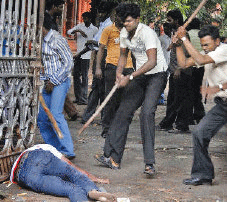 The violent caste clashes, which were intensively covered on national television, between student groups of Chennai’s Dr. Ambedkar Government Law College on November 12, have shocked the academic community in the southern state of Tamil Nadu (pop.62 million). They graphically exposed the slimy underbelly of caste driven animosities which have permeated college campuses in this state, which prides itself on its academic traditions. Television images showed enraged student groups armed with deadly weapons including iron rods, wooden logs and tubelights, brutally beating each other, even as a posse of policemen outside the college gate remained mute spectators.
The violent caste clashes, which were intensively covered on national television, between student groups of Chennai’s Dr. Ambedkar Government Law College on November 12, have shocked the academic community in the southern state of Tamil Nadu (pop.62 million). They graphically exposed the slimy underbelly of caste driven animosities which have permeated college campuses in this state, which prides itself on its academic traditions. Television images showed enraged student groups armed with deadly weapons including iron rods, wooden logs and tubelights, brutally beating each other, even as a posse of policemen outside the college gate remained mute spectators.
Condemning police inaction, the state government transferred commissioner of police, R. Sekar, suspended an assistant commissioner of police and an inspector who were present at the clash, besides suspending the principal of the college K.K Sridev, for not averting the conflict despite having advance intelligence of the possibility of a clash after the semester examination on that day. When students of six other law colleges in the state began reacting violently to the incident, the state government ordered closure of all law colleges and delayed the ongoing semester exams. Three students critically injured in the clash are in hospital, and 26 students have been arrested by the police at the time of writing this report.
Violent conflict between Tamil Nadu’s politically powerful backward castes including Thevars, Chettiars, Nadars and others (popularly referred to as caste Hindus) and lower caste Dalits, are a common occurrence in the southern districts of the state since 1985, and predominantly involve two communities: Thevars and Dalits. While Thevars revere their leader and freedom fighter Pasumpon Muthuramalinga Thevar, the Dalits venerate Dr. B.R. Ambedkar, chief architect of the Constitution of India.
Media reports in Chennai indicate that the proximate cause of the November 12 mayhem in the Dr. Ambedkar Government Law College, which hosts 2,000 students instructed by 25 faculty, was distribution of a pamphlet on the occasion of Thevar Jayanthi (the 101st birth centenary of Muthuramalinga Thevar) on October 30, by a group of caste Hindu students in which the name of the college was shown as ‘Government Law College’ without the prefix ‘Dr. Ambedkar’. This omission was interpreted as an insult to Dr. Ambedkar by first year Dalit students and a deliberate provocation.
Informed educationists in Chennai are unsurprised by caste-driven violence in Tamil Nadu’s seven government law colleges, whose environments tend to be more politically surcharged and caste-conscious (Tamil Nadu politics is heavily caste based) than other educational institutions. Politically ambitious students tend to regard law as the stepping stone to politics. Consequently the state’s nine major political parties are very active on law college campuses.
“Caste consciousness is intensifying by the day in Tamil Nadu and is being encouraged by political parties. The police would not have remained mute bystanders on November 12, unless their hands had been tied by the political powers-that-be,” opines a retired professor of Madras University.
This is confirmed by police sources. Although they had advance intimation of campus violence on November 12, they were wary of intervening. In December 2001, when they entered the Dr. Ambedkar Government Law College hostel premises to quell a violent clash between hostel students and the general public, they suffered official chastisement and the transfer of several top brass. Yet they seem to have forgotten that the Justice K.S. Bakthavatsalam Commission of Enquiry, which probed the December 2001 incident, had ruled that the police has an obligation to enter college premises without permission to quell unlawful violence.
Now following the appointment of a one-man enquiry commission headed by a retired judge to probe the recent violence, the police leadership expresses hope that the commission will provide clear guidelines on preventing and tackling campus violence. Meanwhile, the first bench of the Madras high court has directed that hearing of the criminal charges filed against students engaged in assault and battery on November 12 should be fast-tracked.
Nevertheless, academics and intellectuals despair that law students who will be advocates and judges in the near future, display brazen defiance of the law and propriety. With the distinct prospect of violence-prone students eventually transforming into officers of Tamil Nadu’s courts, the law and order scenario of one of India’s most educationally advanced states looks bleak.
Hemalatha Raghupathi (Chennai)























